Adil Najam
I have often wondered – and seriously – if Pakistanis read?
No, not whether they can read. Illiteracy being what it is in Pakistan, there are many – too many – who obviously cannot. But this question does not pertain to them. This is about those who could read if
they chose to do so. But who often do not. The question, of course, is “why not?”
I realize that I risk sounding either arrogant or uncouth by having phrased the question as I have. Of course, there are many many Pakistanis who do read and read voraciously. Some of them actually write and comment on this very blog. And, quite certainly, there are many many more individuals who not only read but are amazingly – even spell-bindingly – well-read. I can say in all honesty that some of the very best-read and the most widely-read individuals I have ever encountered anywhere in the world have been Pakistanis. People who always amaze me not only by the breadth of their interests but also by the depth of their intellect.
I am sure there are such amazingly well-read individuals in all societies. But the point I wish to make is not about individuals. It is about society. The question is whether we as a society place importance on the joys of reading? Whether we place premium on the intellect of the well-read? Whether we honor and cherish those who are well-read?
My own sense is that, as a society, we do not. And that is a pity.
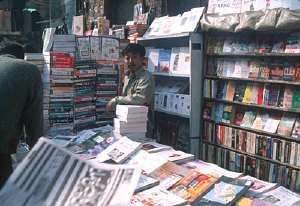 We can joke that in our language (Urdu) we do no “read” the newspaper; we “see” the newspaper. Akhbaar daikha, as opposed to Akhbaar paRha! But the problem is much more than just a joke. It amazes me no end how many of my “learned” friends will actually provide expert commentary on books they have not read. They will give you elaborate critiques based simply on the title or something they overheard someone saying on TV. Indeed, many will start their critique by telling you that they have not read the book and then go on to pontificate on exactly what it is saying and why that is right or wrong (see, for example, some of the comments here or here).
We can joke that in our language (Urdu) we do no “read” the newspaper; we “see” the newspaper. Akhbaar daikha, as opposed to Akhbaar paRha! But the problem is much more than just a joke. It amazes me no end how many of my “learned” friends will actually provide expert commentary on books they have not read. They will give you elaborate critiques based simply on the title or something they overheard someone saying on TV. Indeed, many will start their critique by telling you that they have not read the book and then go on to pontificate on exactly what it is saying and why that is right or wrong (see, for example, some of the comments here or here).
Note, for example, how our conversations (and comments on this blog and elsewhere) are always made with great airs of authority – for example, we don’t say “many people like this movie” we say “99 per cent people like this movie.” No one will ever ask how you came to know that it was, in fact, 99 per cent and not 98 or 89; nor why a wretched 1 per cent did not like the movie! Yet, our assertive and authoritative discourse lacks not just evidence but also reference. We can be prone to inventing facts and numbers to support arguments that we instinctively consider to be true. Yet, we do not seem to quote sources or even ideas too often – except, of course, the Quran (which so many of us so routinely misquote to mean whatever we want it to mean), the hadith, and messers Iqbal and Jinnah.
The exception, I should add in fairness, is poetry. That we do quote and most often quote properly will full reference. But there, too, the habit of reading poetry seems to be on the way out. One hopes that one is wrong in getting the feeling that the traditions of reading Urdu books – whether they be by Quratulain Haider or by Shafiqur Rahman or by Ishtiaq Ahmad – is also disappearing.
Our resident apologists will soon make the argument that there is too much poverty in Pakistan for people to be able to afford reading. But it is not the poor we are talking about. The rich seem to understand the power of thoughts and how it can help you become successful. Then there will be those who will shout out that reading is itself a Western conspiracy and an imposition of all outside ideas should be resisted. This crowd is best ignored entirely. But there will also be those who will argue that books, and therefore reading, is no longer needed because the internet has now arrived. To them, all I can say is please just read some of the comments on many of our posts and decide for yourself just what good the internet has done to either reading or writing!
![]()
By the way, as an aside, some commenters on this blog have suggested that I should stop writing posts and, instead, only write headlines; since too many commenters here obviously never read the full post and comment only on the headline – or, sometimes, just the pictures in the post. I must confess that this irks me too. However, the very fact that some readers would make such a comment proves that there are those who do actually read what we write. And that is enough incentive for us to keep doing so.
But enough of a rant from me. As I noted, I think the above is true in general but not true in particular. It bugs me so much, I think, partly because of my own professional training but also because I sometimes see myself slipping into the same quagmire.
 But the real reason for this long rant was to introduce a wonderful op-ed in The News (24 April 2008) by my friend Nadeem-Ul-Haque (formerly and currently of the IMF and in-between of the Pakistan Institute for Development Economics) which highlights the problem and, maybe, its cause much more eloquently than I have been able to. The op-ed is titled “No Libraries, No Books” and laments the state as well as lack of “real” libraries in Pakistan. There are, in fact, many nice libraries in Pakistan, but not too many functional ones.
But the real reason for this long rant was to introduce a wonderful op-ed in The News (24 April 2008) by my friend Nadeem-Ul-Haque (formerly and currently of the IMF and in-between of the Pakistan Institute for Development Economics) which highlights the problem and, maybe, its cause much more eloquently than I have been able to. The op-ed is titled “No Libraries, No Books” and laments the state as well as lack of “real” libraries in Pakistan. There are, in fact, many nice libraries in Pakistan, but not too many functional ones.
Passages from Nadeem’s hard-hitting and heart-felt article are worth quoting extensively:
Libraries have been the hallmark of growing and progressive civilisations. Even in Sumer libraries of clay tablet writing have been found. Classical Greece and its love for books and learning gave us civilisation. Even the Persian Empire had libraries in Persepolis when Alexander attacked. Roman emperors too set up libraries to be remembered all over the empire. Then there was the famous library of Alexandria which till the early middle ages held most of human knowledge…. Civilised governments have built these repositories of knowledge as national monuments to show how important learning and knowledge is. These grand buildings and their large holdings will remain through history as testaments to these great civilisations many eons from now. Most serious countries have not only large national libraries but also large networks of local public libraries.
… In our history, we have built lovely official residences such as the President’s House, governors’ houses, the Prime Minister’s House and many other buildings, but no libraries. We have built many polo grounds and golf courses, but no libraries. Lahore, an ancient city of culture, now has more polo grounds than libraries. Lahore even has more offices for the chief minister (four in all) than libraries. Of course, the Chief Minister needs office space more than our children need libraries.
A search for libraries on the internet reveals only university and organisational libraries in Pakistan. When you go to university and organisational libraries, you see what a sorry state these are in. They hardly have a collection and are operated like bureaucracies with severe entry limitations and on a short working day, mostly during office hours.
We have no public libraries, beyond what the British left us. The Quaid-e-Azam Library in the old Company Bagh in Lahore (now Bagh-e-Jinnah) is nothing but a bureaucratic enterprise with severe entry limitations and hardly a serious collection. It even does not boast a website in the year 2008.
Our national library did not even get space on the main Constitution Avenue. It is tucked away behind the prime minister’s office as if we were ashamed of it. As its website puts it, it is in a plot of 500 by 100; a little over an acre is all the government could afford for a library. It took us 46 years to come up with the concept for a national library. Even today the National Library has 130,000 volumes, 555 manuscripts, 45 reels of microfilms, 48,000 microfiche cards, 845 magazines and 135 newspapers. What a testament of our great civilisation! I might add that this collection does not even compare to a reasonable sized public library in a civilised country.
In Pakistan I witnessed our bureaucracy and the Planning Commission in this game called “who can spend our development money the fastest on pet projects?” I saw many strange projects like megabuck universities contracted to unknown consortiums, bureaucracies setting up mango-pulp and football-making plants, textile cities, garments cities, and so many others. I asked and wondered why we cannot have projects for community libraries. Why can we not dedicate, say, about Rs50 million for a library in the top 20 cities of our country per year. That is only a billion a year. Not a large sum of money when you think of the vanity projects, VIP trips and the sums required to maintain our VIPs.
But then I was reminded of who demands books in Pakistan? When I go to my rich friends’ houses, I see no books. A million-dollar household with a hundred-thousand-dollar sports car outside has no books. Rich people who spend thousands of dollars on a dinner do not even spend 100 dollars annually on books. None of our political manifestoes even mention libraries. So perhaps the government is right. There is no demand for libraries in our country.
What Nadeem-ul-Haque is saying here is worth thinking about. But before anyone can think about this – or anything else – they will first have to read. And therein lies the challenge. The demand for libraries, after all, comes from the desire to read.



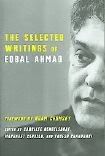
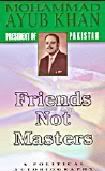

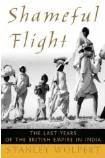
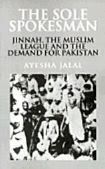
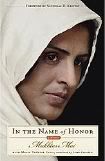
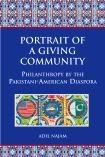

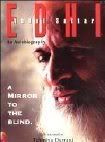
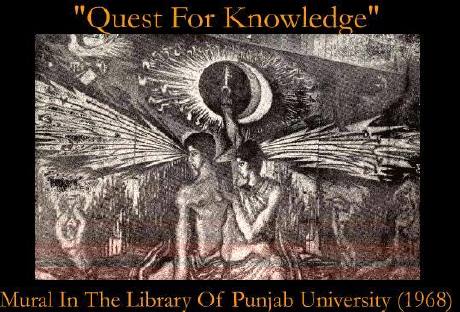



















































Yes, they do.
The Urdu papers full of auks’ford experts. And they both read and write bad Urdu. Everyday!
And they read the English dailies with “press releases” or more gossip, with or without bad English.
And the read the English pontiffs in English dailies and blogs with either more hot air or more pontifications.
And the gossip and the speculation on the blogs. Most energetic when the gossip or the speculation is about who is doing what to whom and when and how.
And some even memorize their foreign bank account numbers and the balances. We suffered a great loss when the mangoes exploded. Too many numbers were lost.
And they read (and write) bad statistics assuring them that Pakistanis have clean water and power available.
And they read the ‘tenders’ that have been fixed for them by their friends in theft.
And they read the wrong history books.
And they read the wrong books on Islam.
And they do not read Qur’an but read books about so called Sharia. This is why their statements on sharia cannot be found in Qur’an.
And they read how the world is conspiring about them and in the process they learn how to deny equity and justice to their fellow Pakistanis.
And they read, and they do, yes they do, how the “feduals” have messed them up, when the text books, the laws, the “gormint” is being run by the ignorant but educated. The idea is to blame someone else for the rights they steal from their fellow Pakistanis.
And they read on how to label their fellow Pakistanis with this or that ism, knowing that it is not the ism, but the absence of equity and justice that is the root of the problems. And by labeling their fellow, they are actually attempting to cover their lies.
And they read, how to sell their own fake, phony and fraud (thanks Bob Grant, many will not know him, that is OK) isms to friends and make money as “consultants”.
Ohhh, I can go on, but you get the point.
Today was a fun day or Monday?